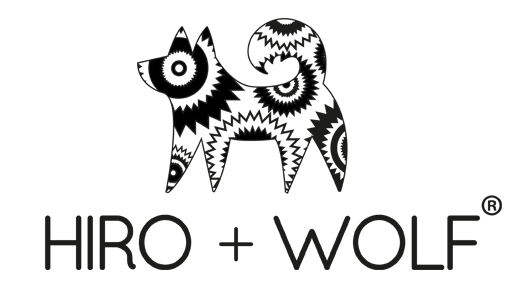On May 3rd there is an annual event to celebrate all that textiles do to improve our lives called World Textiles Day. From fashion to everyday necessity, textiles provide us with a wealth purposes and chances to express ourselves. From the clothes we wear to bedding and furniture, rugs, and of course, pet accessories, textiles are vital to our lives. Sustainability and environmentally friendly approaches to producing textiles are an essential part of the manufacturing process for us at Hiro + Wolf, as well as unique and eye-catching designs.

All of our collections are made from fabric that we have designed in house or from ethically sourced fabrics from our travels. All of our in-house fabric designs are hand drawn by our Co-Founder and Head of Design, Amy. Each design starts it's life as a rough idea in the form of a sketch in order to work out the repeat of the pattern. Amy then uses a light board and layout paper to work this up into a full design. Depending on the complexity of the pattern, this can take anything from a couple of hours to a couple of days. Once the design is finished and coloured using pen and ink, Amy then scans it into photoshop and make the final repeat, sometimes having to go back to the drawing board to fill in any gaps or additional details.

All of our own fabrics are printed in the UK. We currently use two printers, one in London and another in the Peak District. All of our designs are printed onto 100% cotton and our digital printing process in the UK is very sustainable, all of the inks and fabrics used by our factories are solvent free and meet STANDARD 100 by OEKO-TEX®. STANDARD 100 by OEKO-TEX® is one of the world's best-known labels for textiles tested for harmful substances, meaning all products with this certification are tested for high product safety.

As well as our original designs, we also make our pet accessories from limited edition fabrics that we source throughout Africa. What we recognise as African print fabric today has a diverse cultural history. Originally made in Indonesia, West African soldiers serving there during the 1800’s started to import the fabrics heavily patterned batik fabrics into Africa. Later, European traders began replicating the fabrics using modern machinery, in particular the Dutch who remain on of the main producers of Kitenge and Dutch Wax fabric to this day. However, wax print fabrics are heavily imbued with African culture through the use of tribal patterns and motifs. Each pattern and colour can reflect things such as social status, tribe and marriage and are often used by women as a means of non-verbal communication.

All of our limited edition fabrics are sourced by Bee on her travels across her home continent of Africa. These often come from small local markets in Ghana or Senegal but we also buy directly from larger mills in Kenya and South Africa who have a long history of manufacturing our Shuka and Shweshwe styles respectively. African fabrics are world renowned for their unique designs and high quality. The Shweshwe fabric used to make our Fireworks collection is a stunning printed cotton fabric which is widely used for South African clothing, so much so that it is often referred to as the “denim” of Africa. Shweshwe is traditionally used to make dresses, skirts, aprons, and wrap-around clothing. It is traditionally worn by newly married Xhosa women (known as Makoti) and married Sotho women.

Shweshwe is a versatile fabric with many uses and its production is another unique aspect of its design. Manufactured with an acid discharge and roller printing technique on pure coon calico (calico is a plain-woven textile made from unbleached and often not fully processed cotton). What truly makes this fabric so special is the unique designs which are made using pilotage, a fabric technique rarely used by contemporary fabric manufacturers due to its complexity and expense. Bee always ensures our fabrics are authentic and that they are of the highest quality.

We hope you enjoyed learning more about how our textiles are produced! We are very proud of our sustainable and ethical practises when it comes to making the colourful pet accessories that you love. If you have any further questions about our textiles design and production processes, please feel free to get in touch. You can shop our unique range of dog collars here.









